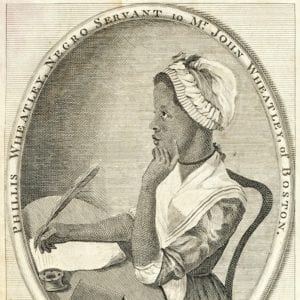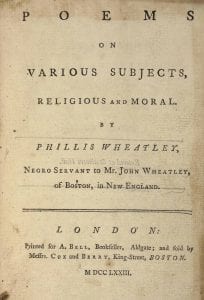Phillis Wheatley – A Delayed Influence
By: Dillon Hartigan
The Great Awakening was a time of significant change in the spiritual lives of numerous Colonial Americans, as they sought to find religion’s purpose within society. Similar to other progressive movements, the Great Awakening provided a platform on which prominent figures could voice an idea or a message. Spiritual equality was a common theme throughout the revival period. George Whitefield preached to thousands of listeners about God’s fairness, and Samson Occom fought to bridge the gap between Native American culture and Anglo-American culture. Moreover, Phillis Wheatley wrote poems concerning the plight of black slaves in Colonial America. She appealed to her personal experience as a former slave to highlight the hypocrisy of slavery in the context of the Great Awakening. Wheatley was not alive to see her poetry make a consequential impact on the abolition of slavery. However, years after the Great Awakening was over and people understood its meaning, Wheatley’s poems were used to fight southern views towards slavery.

Phillis Wheatley was not the average eighteenth-century African slave. John and Susanna Wheatley bought Phillis as a young girl, brought her to Boston, and provided her with an education.
The Wheatleys quickly recognized her poetic talent and encouraged her to continue writing. Phillis Wheatley wrote an incredible number of poems, and historian Thomas Kidd argues that a multitude of Wheatley’s works were meant to “speak out against slavery.”[1] Throughout her illustrious career, many prominent figures like Benjamin Franklin, John Hancock, and Thomas Jefferson came forward to publicly recognize her progressive ideas. Franklin and Hancock were two of her strong admirers; however, Jefferson criticized her poetry for “jeopardizing his assumption about African Americans” [2]. His negative reactions suggest that Wheatley’s poetry was capable of triggering an emotional response in those who supported slavery. Her personal rhetoric challenged the hypocritical intellect of those who followed the social norm.
 Wheatley’s anti-slavery poetry was a threat to common culture, but it is not until the mid-nineteenth-century that her poetry begins to challenge society. Wheatley’s views were far more applicable now that the Great Awakening had made its impact. The American Advocate[3] wrote an opinion article in March of 1834 requiring the reader to consider the great minds lost in slavery. While introducing an interesting argument, the article offered no evidence indicating that slavery was a restriction to brilliance. The Liberator[4], however, draws upon Wheatley’s poetry to prove that exact point. The article suggests that had Wheatley been treated like the typical slave, then she never would have had the opportunity to employ her brilliance through poetry. By the mid-nineteenth-century, anti-slavery proponents were beginning to use Wheatley’s poetry as a means to depict the unreasonably restrictive nature of unequal rights.
Wheatley’s anti-slavery poetry was a threat to common culture, but it is not until the mid-nineteenth-century that her poetry begins to challenge society. Wheatley’s views were far more applicable now that the Great Awakening had made its impact. The American Advocate[3] wrote an opinion article in March of 1834 requiring the reader to consider the great minds lost in slavery. While introducing an interesting argument, the article offered no evidence indicating that slavery was a restriction to brilliance. The Liberator[4], however, draws upon Wheatley’s poetry to prove that exact point. The article suggests that had Wheatley been treated like the typical slave, then she never would have had the opportunity to employ her brilliance through poetry. By the mid-nineteenth-century, anti-slavery proponents were beginning to use Wheatley’s poetry as a means to depict the unreasonably restrictive nature of unequal rights.
Through anti-slavery ideas proposed in newspaper articles such as The Liberator, people from conflicting regions of the United States were brought to discussion. Inspired by the arguments proposed in The Liberator’s article, citizens from both the North and the South were motivated to have an educated debate concerning slavery. According to the Boston Recorder[5], the South initiated the debate by “invite[ing] the Northern abolitionists to visit the South, and urge their views in person”. That is, the South invited the North to have a slavery debate in large part due to Wheatley’s poetry. And if it stands to reason that only the most logical and valid concepts can be used to debate social norms, then Wheatley’s poetry was partially contributing to the abolition of slavery within the United States. Her work was “growing more interesting, not only to the scholar, but the general reader”[6]. It now appealed to contrasting ideological viewpoints more than it did during her lifetime, and the impact her writing had on abolishing slavery was surely becoming more recognizable.
The Great Awakening was an expansion of religious ideas centered upon spiritual equality. Religious leaders of the Great Awakening fought to inspire the masses through many different means. Phillis Wheatley used her poetry to fight against the inequality encouraged by slavery. Initially, her poetry was regarded as a threat to the conventional style of society. However, with time, anti-slavery proponents were beginning to use Wheatley to prove that no race was superior to another. It is through this that one can recognize the lasting impact Wheatley’s poetry served not only in the Great Awakening but also altering the course of United States history.
For Further Reading:
“An Address to the Atheist” – Phillis Wheatley
“An Address to the Deist” – Phillis Wheatley
Early American Newspapers such as the Maryland Journal, Massachusetts Spy, Virginia Gazette, Saturday Morning Transcript, etc
Out of Print: The Religion of Phillis Wheatley by Doreen St. Felix
The Phillis Wheatley Historical Society
Phillis Wheatley at the Massachusetts Historical Society
Phillis Wheatley’s Poems by Jone Johnson Lewis
The Great Awakening: The Roots of Evangelical Christianity in Colonial America – Thomas Kidd
Notes
[1] Thomas Kidd, The Great Awakening (Yale University Press, 2007), 228
[2] Kidd, The Great Awakening, 223
[3] America’s Historical Newspapers
[4] America’s Historical Newspapers
[5] America’s Historical Newspapers
[6] America’s Historical Newspapers
